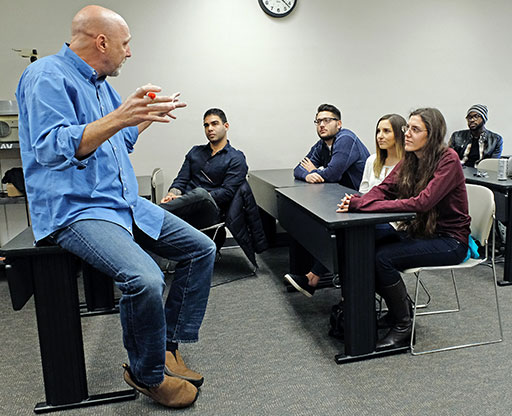Train for a lucrative career in finance or insurance
The interdisciplinary Bachelor of Science in Actuarial Science from the University of Missouri–St. Louis equips you with the in-depth knowledge and quantitative skills to pursue a rewarding actuarial science career. Integrating coursework from both the College of Arts & Sciences and the College of Business Administration, our actuarial science degree prepares you for challenging actuary jobs that offer high earning potential and strong job security.
To become an actuary, you must meet specific requirements of the Society of Actuaries (SOA), including passing the SOA exams and requirements, fulfilling validated educational experience courses and undertaking additional SOA professional training. Our actuarial science degree combines study in calculus, financial mathematics, statistics, economics, econometrics, accounting and finance, providing the foundation you need to meet these requirements.
What does an actuary do?
Actuaries use the tools of economics, finance and mathematics to evaluate and price risk. They play crucial roles in the insurance, pension and finance industries by predicting future events and their financial implications, including:
- Accidents
- Illness
- Life expectancy
- Natural disasters
An actuary also determines insurance premiums, plans pension and retirement, and ensures regulatory compliance.
Program type:
Major, BS
Format:
On-Campus
Take the next step
Request more information below:

Why earn your actuarial science degree at UMSL?
Our actuarial science degree program provides the critical foundation in mathematics, statistics and finance needed for the rigorous SOA actuarial exams or other financial careers.
- Affordability. We offer affordable tuition and have a strong track record of job placement, making our program a good investment. The Stanley and Terry Freerks Endowed Scholarship in Actuarial Science scholarship and Central States Actuarial Forum’s student scholarship can further cut your costs.
- Internship opportunities. Our actuarial science degree emphasizes hands-on learning through internships with leading firms in the insurance and finance industries. This real-world exposure enhances employability and helps you build a strong professional network.
- Location. St. Louis is a hub for the insurance and finance industries, placing you close to many actuarial science career opportunities upon graduation.
What can you do with an actuarial science degree?
Many of our actuarial science program graduates are employed by insurance companies, pension funds, consulting firms and various financial institutions. According to the Bureau of Labor Statistics, the job outlook for actuaries is positive, growing much faster than the average compared to other careers. Actuary salaries are also high, averaging $120,000 per year.
You are not limited to working in an actuary job, though. Actuarial training is transferable to data science and analytics, so many of our graduates pursue careers in human resources, data analysis and finance.
To become an actuary, you must satisfy certain educational requirements, pass exams offered by the Society of Actuaries and complete professional courses. Our actuarial science degree provides the educational background you need to qualify for certification and prepare for SOA exams.
120,000
22
Career Opportunities
- Actuarial Consultant
- Actuary
- Compensation/Benefits Administrator
- Financial Advisor
- Financial Analyst
- Financial Manager
- Information Analyst
- Insurance Underwriter
- Investment Analyst
- Risk Analyst
Plan of study
All majors must meet the general education requirements of the university in addition to completing degree-specific curriculum requirements.
Review Full Degree Requirements Review Sample Four-Year Plan
Non-Missouri Residents: Prospective students are responsible for reviewing the UMSL state authorizations page to see if this program is offered in their state throughout their program and to review the licensure or certification requirements for the state in which they reside.
Student organizations
Our Recognized Student Organizations are a great way to learn new skills and make friends in the actuarial science program and across campus.
Honors College
The UMSL Honors College is a certificate program that can be paired with any major without adding extra classes or extending time to graduate. Classes in the Honors College are seminar-style, meaning that they are based in reading, writing, discussion, and critical thinking. This unique class format fosters an intellectual climate centered around democracy, civility and academic excellence.
Undergraduate research
We encourage and support students as they engage in exciting activities in and outside of the classroom that enrich their academic and professional understanding of their chosen area of study. All majors are encouraged to participate in Undergraduate Research and Scholarship to produce discipline-specific intellectual or creative innovations to their field.








